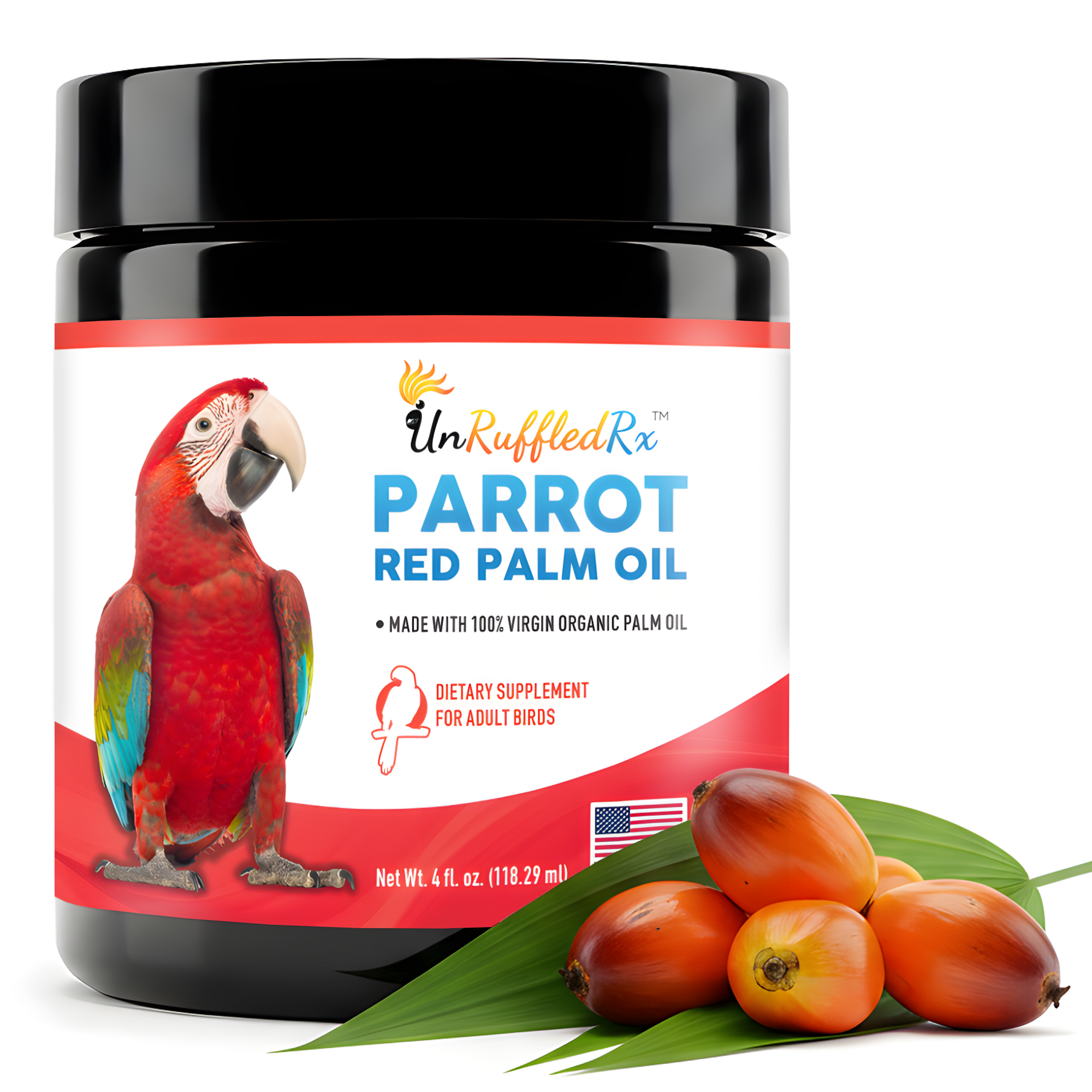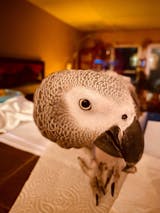Why is My Bird Scratching? 7 Common Causes of an Itchy Bird
- Disease-Related Causes of Bird Itchiness
- Environmental Triggers Making Your Bird Scratch
- Dietary Factors Behind Your Bird’s Itchiness
Does your bird seem extra itchy or prone to scratching?
Birds naturally engage in preening to keep their feathers clean and in top shape for flight. Normal preening involves using their beaks to align each feather, a process that typically takes just a few seconds per feather before moving on to the next. Occasional scratching with their feet throughout the day is also normal, especially during molts or in dry winter months when skin can become dry.
However, if you notice your bird's feathers becoming broken or tattered, red or irritated skin, or your bird persistently scratching itself with its feet or chewing at its feathers, these could be signs of excessive itching.
If your bird's grooming habits seem more intense than usual, it's a good idea to consult with an avian veterinarian to ensure your feathered friend stays healthy and comfortable. Learn what causes excessive itching so that you can offer your scratching bird comfort!
Disease-Related Causes of Bird Itchiness
Giardia in Birds: An Overlooked Cause of Itching
Giardia is a microscopic parasite that can infect the digestive system of birds, leading to a range of uncomfortable symptoms, including itching and feather plucking. It’s fairly common in pet birds, especially in species like cockatiels, and can often go unnoticed until symptoms become more severe.
Birds can contract Giardia through contaminated water, food, or contact with infected droppings, so it’s important to keep cages clean and food sources fresh.
The symptoms of Giardia in birds aren’t always obvious, but they often include loose, watery droppings, weight loss, and, in some cases, excessive scratching or feather picking. If you notice these signs, it’s a good idea to consult an avian veterinarian, who can perform tests to confirm if Giardia is present. Catching it early can help prevent further discomfort and health issues for your bird.

Treatment for Giardia usually involves prescribed anti-parasitic medications, along with supportive care to help your bird’s digestive and immune systems recover. Regularly cleaning your bird’s environment and ensuring access to clean, fresh water can help prevent future infections.
Mites & Parasites: Is Your Bird Battling Itchy Pests?
Mites and other external parasites can be a real nuisance for birds, causing intense itching and discomfort. These tiny pests often latch onto a bird’s skin, feathers, or beak, leading to symptoms like scratching, feather loss, and, in some cases, scaly patches on the face or legs. Mites are especially common in budgies and canaries but can affect any bird species under the right conditions.
Spotting mites can be tricky, as they’re very small and can hide in feathers. However, signs like restless behavior, scratching, and visible changes to the skin or feathers are often strong indicators. If you suspect your bird has mites or another parasite, an avian vet can examine your bird, confirm the diagnosis, and recommend the best treatment.
Treatment for mites typically involves a vet-prescribed topical or oral medication to clear the parasites, along with a thorough cleaning of your bird’s cage and surroundings to prevent re-infestation. Routine cage cleaning and regular wellness checks can go a long way in keeping your bird free of these itchy pests.
Liver Disease in Birds: An Unexpected Itching Culprit
Liver disease in birds is a serious condition that can affect many aspects of their health, often showing up first through subtle signs like changes in behavior or abnormal droppings. Since the liver is responsible for processing nutrients and detoxifying the body, any issues with liver function can lead to visible symptoms, including loose, yellowish, or even greenish droppings, which may indicate bile build-up. Cockatiels, budgies, and Amazon parrots are particularly prone to liver disease, especially if their diet lacks balanced nutrition. (Source: Merck Veterinary Manual, Avian Journal of Medicine and Surgery)
In addition to changes in droppings, birds with liver disease may become lethargic, lose weight, or show feather quality issues like dullness or excessive molting. If you notice these symptoms, a prompt visit to an avian veterinarian is essential. The vet may perform blood tests and imaging to assess liver health and determine the cause.
Treatment often involves dietary changes to support liver function, including foods high in antioxidants and low in fat. Sometimes, medication may also be prescribed to reduce liver inflammation or manage other symptoms. A well-rounded diet with a variety of nutrients, particularly vitamin A, is one of the best preventive measures to keep your bird’s liver in top shape.
Environmental Triggers Making Your Bird Scratch

Environmental factors can play a big role in triggering itching and discomfort in birds, particularly if their habitat isn’t optimized for their specific needs. Here are a few common environmental triggers to watch out for:
Low Humidity
Birds are naturally adapted to higher humidity levels, especially species from tropical climates. Indoor heating during winter can significantly lower humidity, drying out their skin and feathers. This dryness can lead to itching, scratching, and sometimes even feather plucking. A humidifier near your bird’s cage or regular misting can help maintain moisture levels.
Poor Air Quality
Birds have sensitive respiratory systems, so things like dust, dander, smoke, and household chemicals can irritate them and even lead to skin discomfort. Air purifiers can help keep the air clean, but it’s also essential to avoid using aerosol sprays, scented candles, or strong cleaners around birds.
Dirty or Damp Cages
A cage that isn’t cleaned regularly can harbor bacteria, mold, or mites—all potential sources of irritation and itching for birds. Damp environments, especially, can promote mold growth and attract mites. Regular cage cleaning, ensuring dryness, and changing food and water daily are crucial.
Lack of Bathing Opportunities
Birds need regular bathing to maintain healthy skin and feathers. Without access to clean water or misting, birds may experience itchy, dry skin and could start scratching excessively. Offering a shallow bowl for bathing or misting your bird a few times a week can keep them comfortable and reduce itching.
Improper Lighting
Birds need exposure to natural light or full-spectrum lighting to maintain their health, including skin and feather quality. Lack of proper lighting can impact their hormone regulation and, in some cases, lead to behaviors like excessive preening or scratching. Ensure your bird’s cage is placed in an area with indirect natural light or use bird-safe, full-spectrum bulbs.
Dietary Factors Behind Your Bird’s Itchiness
Nutritional Deficiencies: Does Your Bird’s Diet Need a Boost?
Birds that are picky eaters or primarily on seed diets often miss out on key nutrients essential for healthy skin and feathers. Seed-based diets can lack important vitamins, minerals, and fatty acids that birds need to maintain vibrant feathers and moisturized skin. Without these nutrients, birds may experience dry, itchy skin, brittle feathers, and even increased susceptibility to infections. Learn about how to improve your birds diet here.
Vitamin A Deficiency
Vitamin A is essential for maintaining healthy skin, feathers, and mucous membranes. Birds lacking this nutrient often experience dry, flaky skin and may be more prone to respiratory infections. Vitamin A can be provided through foods like sweet potatoes, carrots, and dark leafy greens or through avian-specific supplements, under guidance from a vet.
Essential Fatty Acids (EFAs)
EFAs, such as omega-3 and omega-6, play a crucial role in keeping skin hydrated and reducing inflammation. A deficiency can lead to dry, itchy skin and brittle feathers. Many birds don’t receive enough EFAs in a seed-based diet, so adding sources like flaxseed, chia seeds, or specialized supplements can be beneficial.
Biotin (Vitamin B7)
Biotin is a B-vitamin that helps maintain healthy skin and feather quality. A lack of biotin can cause dryness, poor feather condition, and in some cases, feather loss. Fresh vegetables, grains, and some fruits can provide biotin, supporting skin health and feather regrowth.
Protein Quality and Amino Acids
Birds need high-quality protein to support skin and feather development. Amino acids, the building blocks of protein, are essential for healthy feather growth and repair. Foods like cooked eggs, legumes, and specially formulated bird pellets ensure a balanced intake of amino acids.
Zinc
Zinc supports cell growth and repair, which is vital for healthy skin and feathers. Zinc deficiency can lead to poor feather condition and increased susceptibility to skin issues. While it’s important, excessive zinc can be toxic to birds, so consulting with an avian vet about balanced supplementation is recommended.
Calcium and Vitamin D
These nutrients work together to support bone and feather health. Birds lacking calcium and vitamin D may show signs of weak feathers and skin issues. Calcium-rich foods, like leafy greens and properly formulated bird pellets, along with access to natural sunlight or UV lighting, can improve calcium absorption and skin health.
Food Allergies in Birds: Could Common Ingredients Be Causing Itch?
Some birds react to artificial colors or preservatives, leading to scratching. Find out if your bird’s diet might be the issue and how to make healthier choices.
In conclusion, it is important to understand why birds might be itchy and what to do about it. A variety of factors, such as giardia, mites, low humidity, food allergies and sensitivities, nutritional deficiencies, and molting can all contribute to a bird's itchiness. It is best to consult a veterinarian or certified avian specialist to determine the cause of your bird’s itching and develop a treatment plan. With proper care, you can help keep your bird healthy and free from itchiness.
Related Posts:
Bird Vitamin A Deficiency? These Diet Hacks Will Help!
Why Vitamin D for Birds is So Important to Keep Them Healthy
Your Complete Guide to Bird Calcium for Optimal Health and Happiness
References:
Korver, D. (2023). Vitamin deficiencies in poultry. In Merck Veterinary Manual. Retrieved from https://www.merckvetmanual.com/poultry/nutrition-and-management-poultry/vitamin-deficiencies-in-poultry?query=vitamin%20A%20deficiency
Lightfoot, T. L. (2020). Digestive disorders of pet birds. In Merck Veterinary Manual. Retrieved from https://www.merckvetmanual.com/bird-owners/disorders-and-diseases-of-birds/digestive-disorders-of-pet-birds?query=giardia
Vogelnest, L. (2007). Itchy exotics. In World Small Animal Veterinary Association World Congress Proceedings. University of Sydney, Veterinary Centers. Retrieved from https://www.vin.com/apputil/content/defaultadv1.aspx?id=3860778&pid=11242
Wissman, M. A. (2013). Skin allergies. Exotic Pet Vet. Retrieved from https://www.exoticpetvet.net/avian/allergies.html
Diane Burroughs, LCSW is a licensed psychotherapist trained in ABA therapy techniques. She specializes in avian anxiety disorders and is certified in Nutrition For Mental Health. Diane has written a number of bird behavior books and she offers behavior consultations. She's developed a range of UnRuffledRx Science-backed Parrot Wellness Supplies.
Diane's products have been featured in the Journal of Avian Medicine and Surgery and at Exoticscon, a conference for exotic pet veterinarians. Her bird collars & supplements are stocked in avian vet clinics and bird stores throughout the US. With over 30 years in the field of behavior, Diane has created thousands of successful individualized behavior plans that help pets thrive.
TAGS: #BirdItching #ItchyBird #ItchyParrot
SHARING IS CARING! PLEASE SHARE ON YOUR FAVORITE SOCIAL MEDIA NOW!















